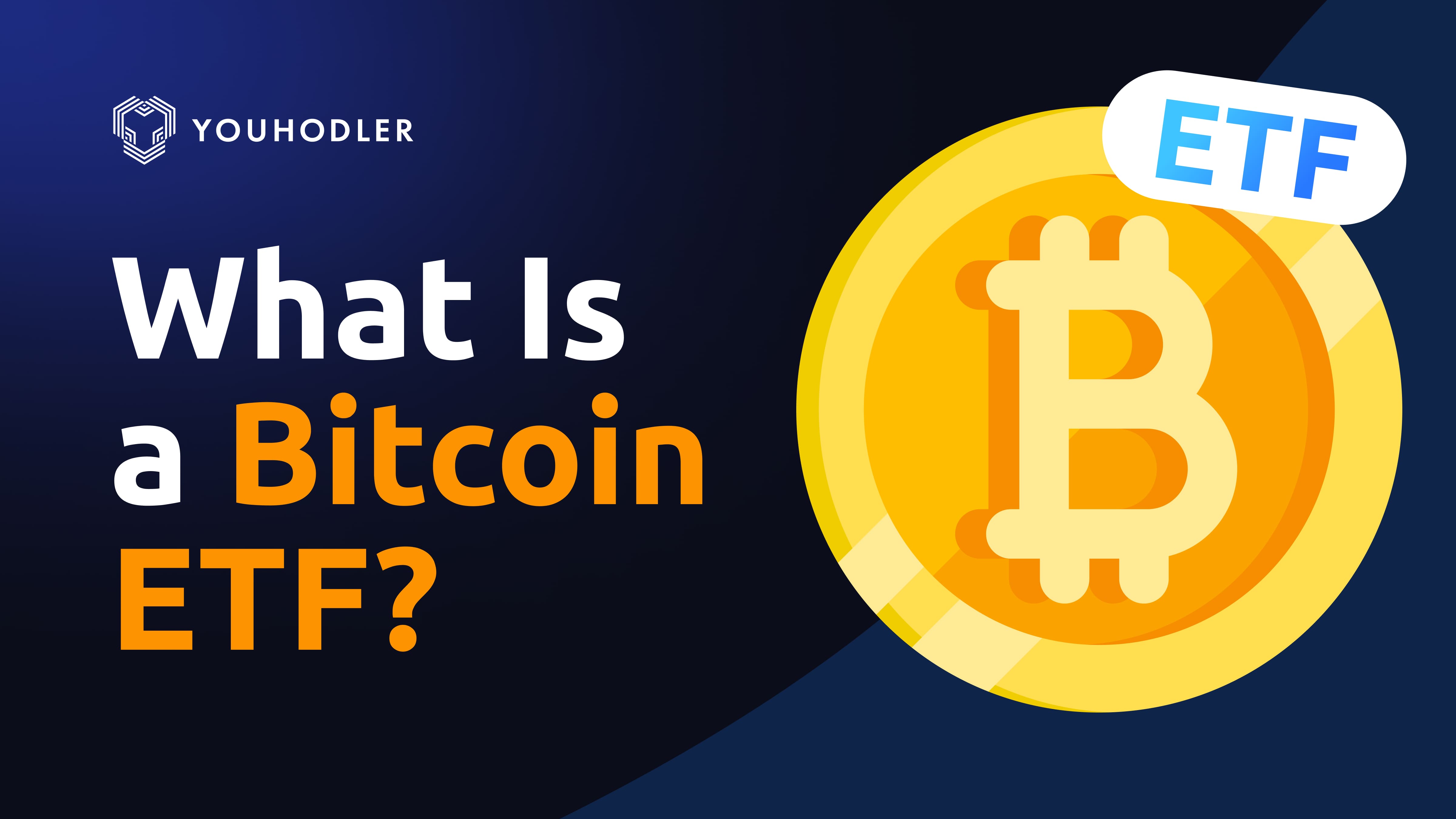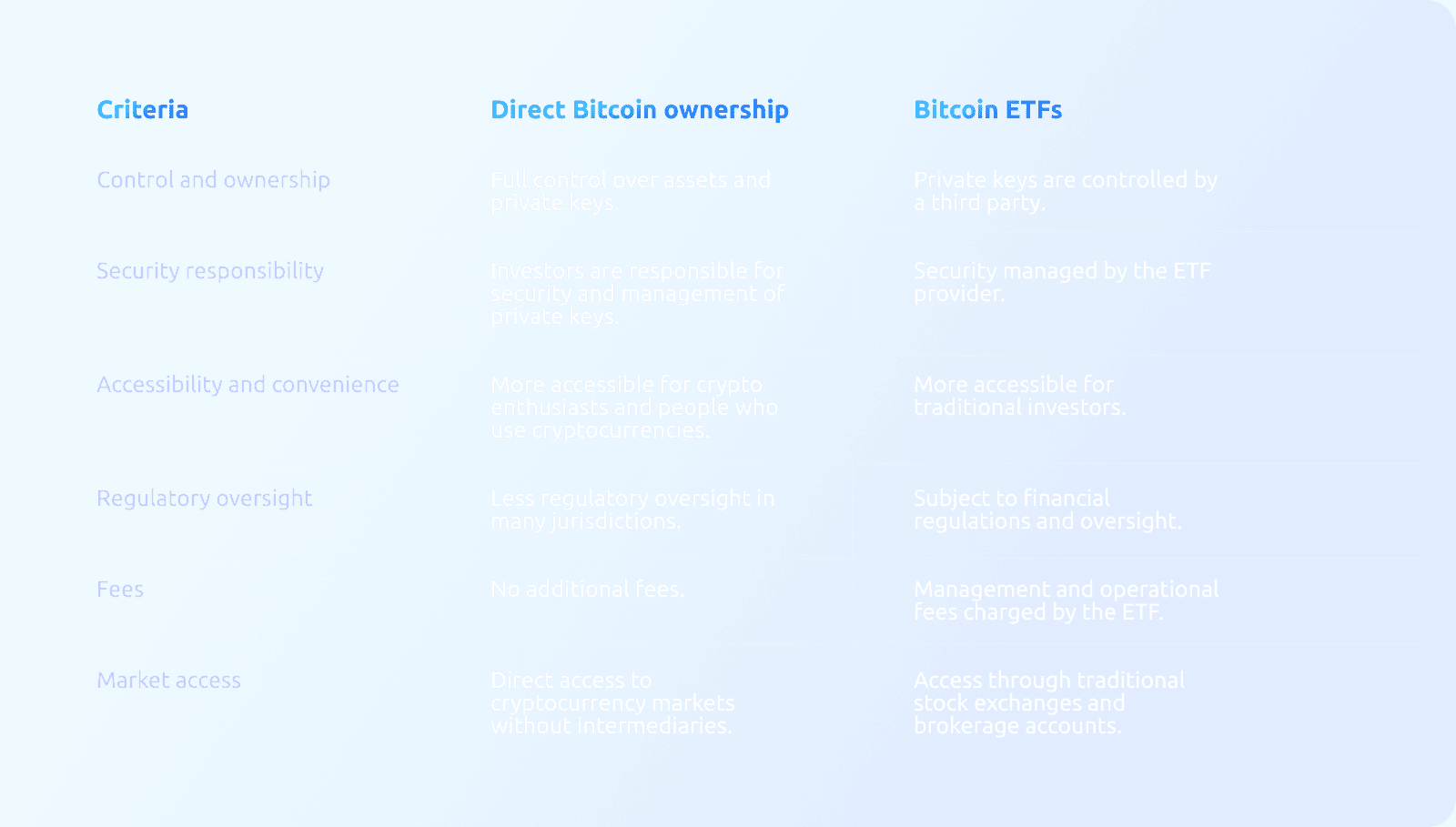What Is a Bitcoin ETF? | YouHodler

What Is a Bitcoin ETF? How It Works and What Are the Risks?
Explore the realm of Bitcoin ETFs in our article, where we dissect their operation, compare them with direct Bitcoin ownership, and shed light on their benefits and risks.
The emergence of Bitcoin Exchange-Traded Funds (ETFs) has sparked a new interest among investors looking to enter the cryptocurrency market. In this article, we explore Bitcoin ETFs, how they work, their advantages, and the risks they carry.
What Is a Bitcoin ETF?
An Exchange-Traded Fund (ETF) is a type of investment fund and exchange-traded product, which is traded on stock exchanges much like individual stocks. An ETF holds a single asset or portfolio of assets that are grouped together based on specific criteria. It can be a variety of investment types like stocks, commodities, bonds, currencies, or indexes. Therefore, while investors in an ETF invest in the fund's portfolio, they don't directly hold any of the underlying assets themselves.
An ETF combines the diversification of a mutual fund with the ease of trading associated with stock shares. It allows investors to diversify their investments without owning the assets directly.
A Bitcoin ETF specifically aims to track the price of Bitcoin, the leading cryptocurrency, offering investors exposure to its price movements without the need to directly buy, store, and secure actual bitcoins.
How Bitcoin ETFs work
Bitcoin ETFs operate under the same basic principles as traditional ETFs but are designed to track Bitcoin's value. This is achieved by the ETF holding Bitcoin or Bitcoin-related assets on behalf of the investor.
Investors can buy and sell shares of a Bitcoin ETF through traditional brokerage accounts, making it accessible and familiar to those already investing in the stock market.
What are the types of Bitcoin ETFs?
Bitcoin ETFs can be categorized based on the methods they use to gain exposure to Bitcoin's price movements.
- Spot Bitcoin ETFs. Spot ETFs hold actual Bitcoin in custody, with each share of the ETF representing a direct claim on a specific amount of Bitcoin. The value of the ETF's shares moves in tandem with the price of Bitcoin, minus any fees and expenses the fund incurs. These ETFs offer direct exposure to the price of Bitcoin.
- Futures Bitcoin ETFs. Futures ETFs invest in futures contracts for Bitcoin rather than holding the cryptocurrency directly. These futures contracts are agreements to buy or sell Bitcoin at a future date at a predetermined price, allowing the ETF to bet on the future price movements of Bitcoin.
Comparison with direct Bitcoin ownership
Bitcoin ETFs are an alternative way to invest in Bitcoin, which began to rapidly gain popularity after the spot Bitcoin ETFs approval. This method of investing compared to buying Bitcoin directly has both advantages and disadvantages.
A Bitcoin ETF presents various benefits to individual investors who may be interested in gaining exposure to Bitcoin without directly owning the cryptocurrency:
- Accessibility and convenience. Retail investors can buy and sell shares of the ETF through traditional brokerage accounts, just like they would with any other stock. This eliminates the need for opening and managing cryptocurrency wallets as well as purchasing Bitcoin directly.
- Regulatory oversight. ETFs are traded on regulated exchanges and are subject to the oversight of financial authorities, offering a layer of investor protection.
- Reduced security concerns. Bitcoin ETFs remove the need for investors to handle the security issues associated with holding actual bitcoins.
However, Bitcoin ETFs have some serious disadvantages compared to directly owning Bitcoin:
- Lack of control. With Bitcoin ETFs, investors do not have direct control over the underlying asset. They rely on the ETF issuer to hold private keys and are not able to manage and transfer their bitcoins themselves.
- Accessibility and convenience. For people who have no experience with traditional brokerage accounts, the process of simply buying Bitcoin may be easier than the process of buying Bitcoin ETFs.
- Management fees. Bitcoin ETFs typically charge fees, which diminish investors' returns. These fees are incurred regardless of the performance of the underlying assets.
- Regulatory constraints. Regulatory changes or restrictions could impact the operation of Bitcoin ETFs, potentially affecting their liquidity, availability, and overall performance.
- Counterparty risk. When investing in a Bitcoin ETF, investors are exposed to counterparty risk, which means they rely on the ETF issuer's ability to fulfill its obligations. If the issuer encounters financial difficulties or fails to properly manage the ETF, investors could suffer losses.
- Lack of access to the crypto market. Purchasing Bitcoin directly allows investors to engage with the cryptocurrency market without intermediaries. Direct ownership gives the ability to sell or trade Bitcoin at any moment without any delays that may occur with an ETF.
- Lack of access to the Bitcoin ecosystem. Bitcoin ETFs do not provide investors with the same level of exposure to the broader Bitcoin ecosystem as direct ownership. This includes using Bitcoin as a means of payment, as well as potential benefits such as receiving forks and airdrops.
Direct Bitcoin ownership vs. Bitcoin ETFs

Conclusion
To summarize, Bitcoin ETFs present a solution for investors looking to participate in the cryptocurrency market without the complexities of direct ownership. While they offer some convenience for traditional investors and regulatory oversight, investors should be mindful of the associated drawbacks and risks, as well as limitations in terms of portfolio customization, control and access to the broader crypto ecosystem.
faq quetstion
.svg)
Suggested Posts



YouHodler is regulated in Switzerland, the EU and Argentina.
YouHodler SA
Registered financial intermediary
YouHodler Italy S.R.L.
VASP registered at OAM / MICAR
YouHodler SA
Registered as VASP with Banco de España
YouHodler SA Branch in Argentina.
Registered as a VASP with the CNV.





.jpg)
.jpg)
.jpg)
